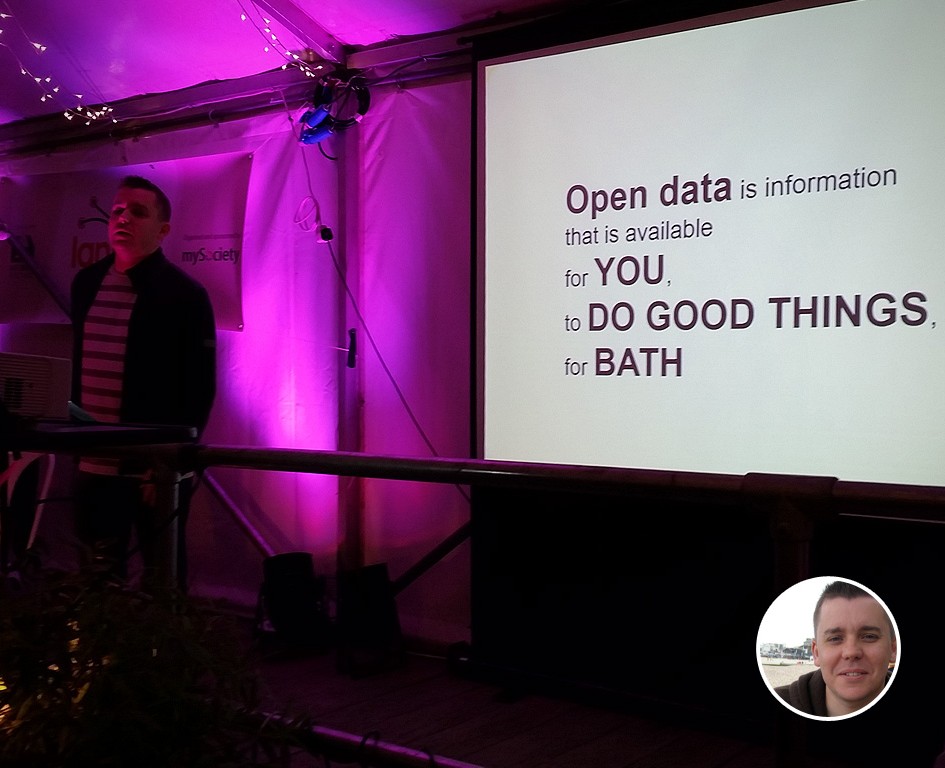Last week I gave a 5 minute talk at the Ignite for Good event held as part of Bath Digital Festival. The event was excellent. There were a lot of different speakers, a really enthusiastic audience, and it was held in one of my favourite Bath pubs.
I thought I’d share the slides and a transcript of the talk for those of you who couldn’t make it.
[slideshare id=41043826&doc=ignite-for-good-open-data-ldodds-141103045905-conversion-gate02]
My name is Leigh Dodds and I love open data. And I want to convince all of you that you should too. But if I’m going to have any hope of doing that then I need to tell you what open data is. So here’s a definition for you.
Open data is information that is available for anyone to use, for any purpose, at not cost. Practically speaking that means you can find it on the internet and download it for free, in some useful format that you can use.
I should be clear that open data isn’t personal data. Your medical records, bank transactions, mobile phone logs, that is all your personal data. You, as individuals, should have access to it, but it shouldn’t be openly available.
But that still leaves a lot of information. Practically everything around us these days has some kind of data attached to it. Bus stops, car parks, air quality sensors, economic statistics. There’s a huge amount of data that could be opened up.
The problem is, its usually locked anyway on someone’s hard drive. The data may have been collected for a specific purpose but then not published. Data has this quality that if you connect it to other sources then it becomes more valuable. So by opening it up, we can unlock more value from it.
I work as an associate with the Open Data Institute. We’re a not-for-profit based in London and we help people publish and consume open data more effectively. We work with startups, run training courses, and advise governments on open data policies.
But why do we do this? Why should someone open up their data? I’m going to give you the 3 main reasons that people often quote and then share with you a local open data story that will bring that to live.
The first reason is transparency. If local and central government, and other organisations publish data about their activities then as citizens we may be better able to hold them to account.
The second reason is for economic growth. Open data is a resources that businesses can use to create new products, streamline existing products and explore new business models. There’s a lot of value that can drive growth.
The third reason is for social good. If we have more information about the world around us and the problems that people face in their everyday lives, then maybe we can use that data to find some creative solutions to those problems.
So those are the 3 big ideas, now let me tell you a local story.
Bath, like every council, has to monitor the kitchens of local restaurants. They are assigned a hygiene rating which is then centrally published as open data for anyone to use. The problem is, they often don’t.
Enter Bath Food. This is a website and a twitter account you can follow to learn about the latest ratings. On the website you can see the history of ratings for a restaurant. Its changed the way I eat in the city.
There’s also a local start-up called Sure Sense that make a product that helps kitchens be more efficient. To stay on top of all of those important jobs that keep a kitchen clean and healthy. They use the ratings to help guide their sales efforts as they can identify which kitchens could benefit from their product.
So that adds up to a nice local open data success story. BANES are being transparent about their activities and Bath Food is doing some social good by helping us to eat more healthily. Sure sense, as a local business is able to use that data to grow its business. Ultimately the restaurants benefit too as they improve their ratings.
I think that demonstrates how the big ideas of open data can result in some local benefits, making Bath a better place to live and work. And we want to have more of those stories in the area.
Let me introduce Bath: Hacked. This is your local open data project. We want to bring open data to life in the city. The first thing we’ve done is build a data store.
A data store is a website that can help you find useful open data. We’ve already populated it with data about all aspects of living and working in Bath & North East Somerset. But we want to do more than just publish the data, we want to show how it can be used.
So we’re running hack days and we have a big one running this week. For example at our last hack day we focused on air quality data. We were able to show that, despite what you hear on the radio or read in the papers, the air quality in Bath has been improving year on year. We’re trying to be better informed about the city we live in.
Let’s return to my original definition of open data: its information that is available for anyone to use, for any purpose, at not cost. Tonight I want to change that definition a bit and say that open data is information that is available for you to use (all of you), to do good things for Bath.
Using open data we can make Bath into a healthier, wealthier and more interesting place to live. And that, ladies and gentlemen, is why I think you should love open data. Thank you!

